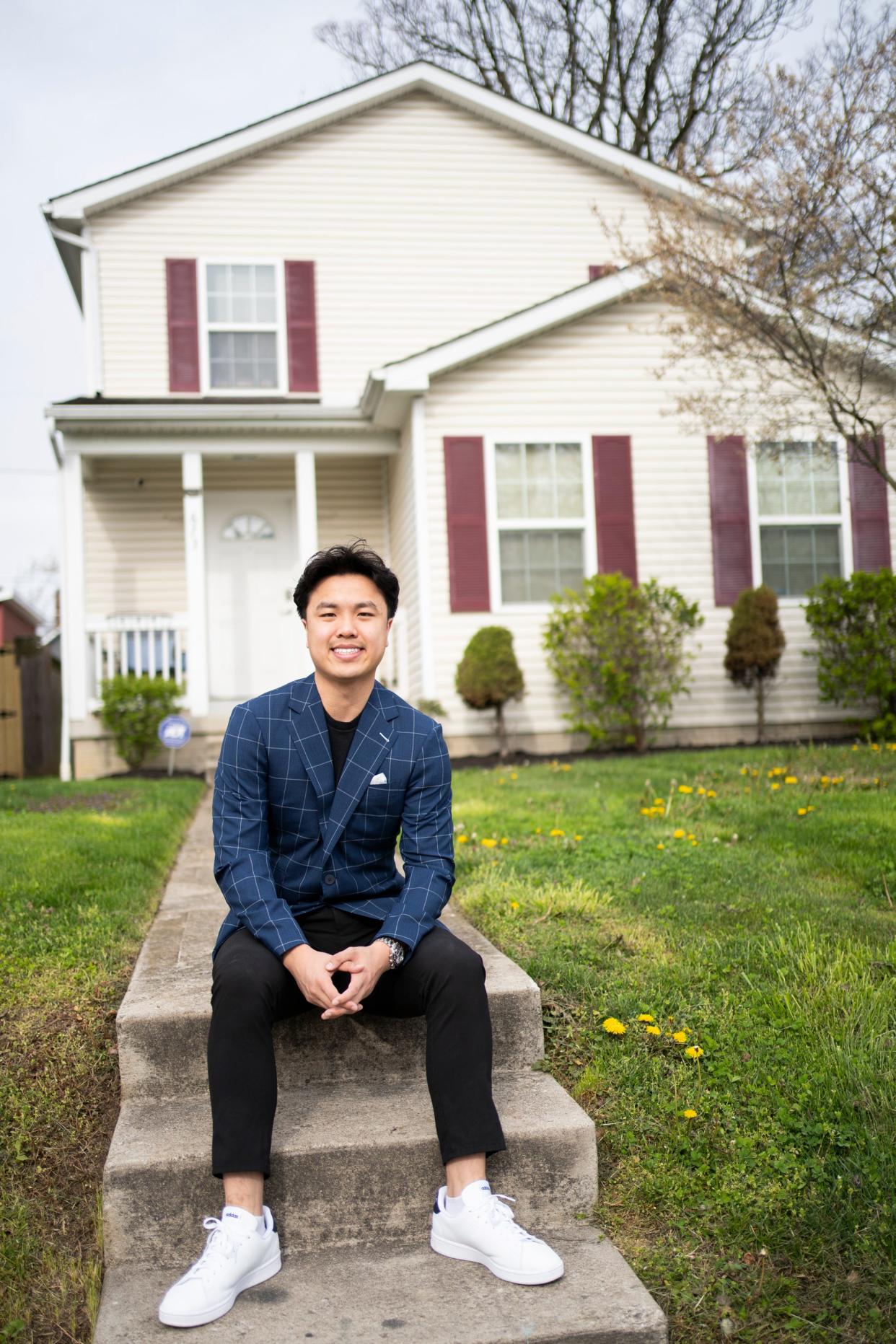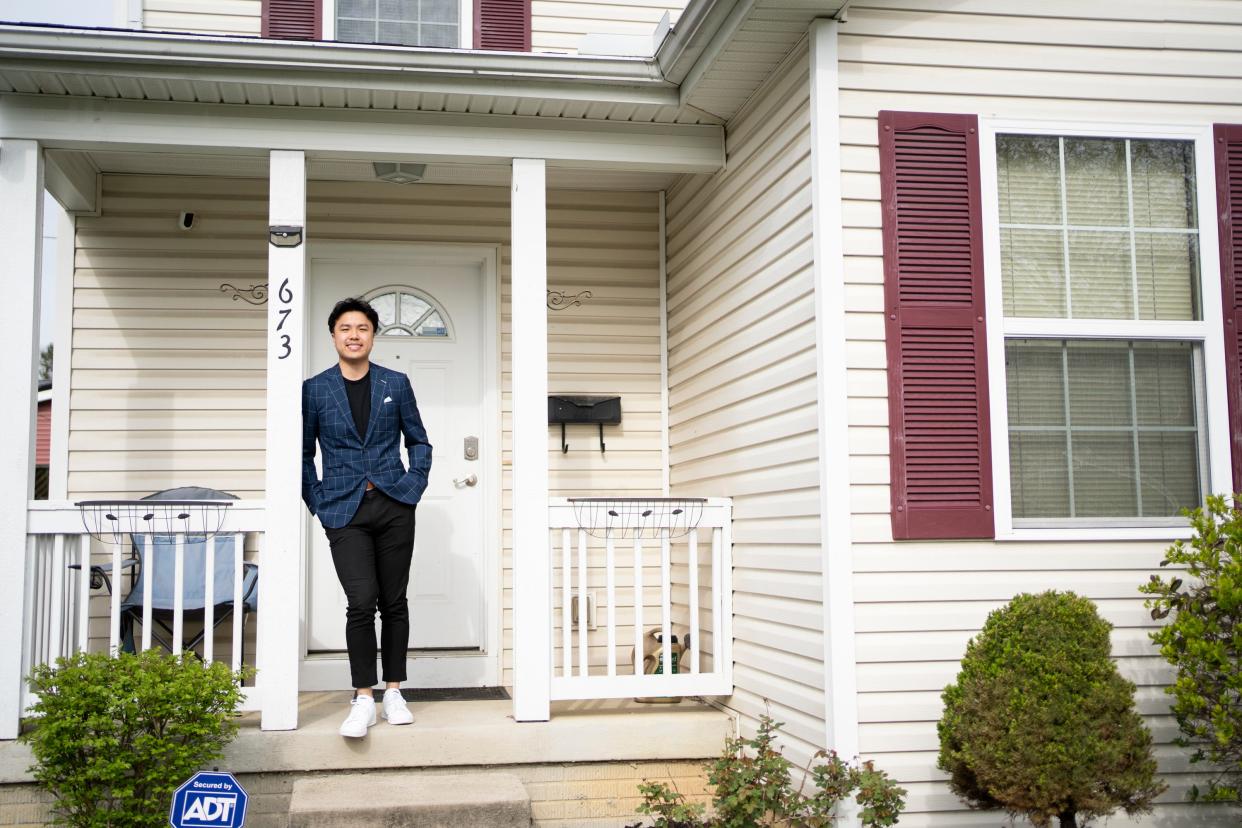'House hacking' is Generation Z's new approach to home buying: What is it?
Jimmy Lieu dropped everything and moved from his hometown of Portland, Oregon to a place he’d never even visited — Columbus, Ohio.
The now 25-year-old moved because he was faced with home prices in the high six figures in his hometown, and he knew he wanted to buy a property he could rent out to try to build wealth.
After a quick Google search, Lieu found that Columbus was a top real estate market with a growing population, still reasonably priced homes compared to other large cities, and a lot of potential growth with companies like Amazon and Intel investing here. So he hit the road.
"It's been one of the best decisions, moving to Columbus," said Lieu, who bought his first house on the city's South Side in 2021.

He rents three of his home's four bedrooms out to cover the mortgage, in a practice known as "house hacking."
And he now owns eight properties in central Ohio, including one he lives in, saying the risks he has taken have worked out well.
Related article: Columbus initiative taps Black, female real estate developers to create affordable housing
What is house hacking? Living rent-free
House hacking is a strategy where people rent out part of a property they own and live in the other, with the goal of dramatically reducing or covering their mortgage and other living expenses, said Lieu, a realtor with Swiss Realty, a Columbus agency.
Lieu started by renting out three of the bedrooms in his home for $600 each a month. He lives in the fourth, and the $1,800 per month in rental income he earns more than covers his mortgage.
House hacking has grown in popularity in recent years because it is a way for younger home buyers to afford to purchase property and take advantage of tax incentives associated with home ownership like the mortgage interest tax deduction, said Scott Trench, CEO and president of Bigger Pockets, a wealth-building site focused on real estate that features a podcast by the same name.
The concept is centuries old, but the term and practice have been catching on among Generation Z (born between 1997 and 2012) and millennials (born between 1981 and 1996) as a way to buy property and build wealth.
More than half of millennial and Gen Z buyers view the opportunity to rent out a portion of their home for rental income as “very” or “extremely” important, according to a 2023 report by housing market site Zillow. That’s compared to 39% of all home buyers, which is up eight percentage points in the previous two years.
Real estate development: Developers call Columbus proposed zoning code good first step
The term has "totally entered the cultural zeitgeist," said Alec Santiago, who bought a duplex on Columbus' South Side a few months ago.
His plan to rent out half of it doubled his buying power, said Santiago, 31, who knew he wanted to house hack.
He got interested after listening to the Bigger Pockets podcast, doing his own research and seeing friends doing it. He moved from Houston to Columbus because of a job opportunity, as well as opportunities he saw in the housing market — including lower-cost homes and more options when it comes to buying.
The renters who had an existing lease when he bought a property two months ago cover about 40% of his mortgage. But rent prices rise each year, meaning the amount he has to pay is going to get smaller, Lieu said.
House hackers get the benefit of paying down the principal on their mortgage, building equity and may get cash flow from renting parts of their home out, Lieu said.
Either way, it's almost always less expensive than renting an apartment, he said, especially since housing costs are at a record high in Columbus and median rent per month was $1,298 in December, according to Yardi Matrix, a real estate service.
After receiving his doctoral degree and getting a job with Ohio State University a little more a year ago, Santiago felt like he was behind his peers financially and wanted to house hack to increase his net worth more quickly.
"(House hacking) seems like one quick action that has more than one return," he said. "It's nice to take bigger steps and skip a couple of steps."
Who's house hacking in Columbus and why?

House hacking is most popular among Gen Zers, Lieu said.
"If you're single, you're younger, you have the flexibility to live wherever you want with little to no privacy," Lieu said. "When you have a family and a wife to provide for and have kids, obviously, house hacking is more difficult."
Trench, 33, pointed to the "decade of sacrifice" — a phrase and concept Jaspreet Singh, host of the investing podcast The Minority Mindset Show, coined — to refer to what is needed to retire early. And he said a person can make that "decade of sacrifice" in their 20s, with house hacking playing a role that will pay off dividends in the long run.
"For the last 10 years off and on, I've been housing hacking, living in a place well below my means," he said.
His first house hack didn't have central air or a dryer and he did a lot of the necessary maintenance himself. Trench said he had an older car and used a bike to get around, and mostly cooked at home instead of going out to eat as part of his frugal lifestyle.
"You are giving up something," he said. "You are agreeing to manage tenants, likely doing a lot of work yourself — in pursuit of wealth."
Trench moved into a home this month that he isn't hacking.
"I've been investing in real estate for a long time so one day I could do this and feel reasonably good about it," he said of buying a home just for him and his wife. Trench owns five properties, with a total of 13 units, with a partner in Denver, Colorado. He has lived in three of those homes at one point.
House hacking is also a good way to get into real estate investing and learn how to be a landlord, he said.
That's how Tommy Harr got his start.
The Pickerington native's first real estate investment in Bexley didn't work out.
It wasn't until he took a risk and made a bet on a home in Merion Village that it worked, despite people saying he was crazy to buy in the neighborhood.

Seven years later, he has his own real estate investing company, Legacy Homes, and helps others learn how to invest as well through an online community called Real Side Real Estate.
After the now-29-year-old made lots of "rookie mistakes" and lost money on his first house flip, Harr fell in love with the Bigger Pockets podcast and, subsequently, house hacking and the idea of financial freedom.
"When you're young, before you buy a house, you've got to house hack, you've got to eliminate your housing cost," Harr said. "It's a no-brainer."
Harr said he tells everybody about house hacking. He said helped two of his four younger siblings buy their own homes to hack and his mom, a former teacher, quit her job to work full-time for him as a real estate agent.
Apart from intergenerational transfers of wealth, Trench said house hacking will play a major role in distinguishing between who becomes wealthy and who struggles and falls behind in future generations.
What are the trade-offs with house hacking?
Still, house hacking doesn't come without challenges and trade-offs.
Being a landlord is hard work, and sharing space, even if it is just the walls between a duplex, is a requirement. Lieu said it's important to vet tenants carefully, conduct income and background checks and find the right people to live with you.

It's also up to house hackers to mow the lawn, clean the gutters and do property maintenance.
Santiago feels he's grown as a person through being a landlord and being responsible for the quality of someone else's home.
People may also have to buy in less 'desirable' areas or neighborhoods to be able to afford to buy a property, Harr said.
The key ingredient, he said, is being resourceful, working hard to improve your property and relentlessly going after what you want and can afford.
"I got lucky," Harr said. "A lot of it is just betting on yourself."
dking@dispatch.com
@DanaeKing
Subscribe to our Breaking Ground newsletter!
Jim Weiker breaks down the latest on real estate and development.

Sign up for The Breaking Ground newsletter
This article originally appeared on The Columbus Dispatch: 'House hacking' helping Gen Z get into real estate investing
